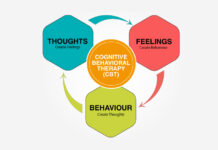
Yo-yo and extreme diets can actually cause weight gain over time by impairing your thyroid function. If you’ve been caught in a cycle of fad diets, here’s how to get back on track.
By Mirna Sharafeddine, B.Sc, R.H.N.
You’ve tried every diet out there, and despite your best efforts nothing seems to work. To top it off, you’re exhausted, stressed and confused. What you may not realize is that all your weight loss efforts could actually be having the opposite effect. Dieting can slow your metabolism and hinder your ability to lose weight.
When you go on an extreme calorie-restrictive diet, your body responds by turning your calorie and fat-burning ability to low in order to conserve energy for essential body functions. The energy required to sustain those vital functions is called your basal metabolic rate (BMR), and it mainly depends on your age, gender, muscle mass and the health of your thyroid. An average woman (5-foot-2 and 130 pounds) has a resting BMR of about 1,200 to 1,300 calories. That’s the amount of food you need to eat each day in order to maintain your basic activities such as breathing, digesting food and keeping the brain, heart and lungs working. Any movement requires additional calories. If you follow a diet with insufficient calories to support your BMR for a month or longer you may start to experience metabolic troubles.
The Thyroid Connection
So how does all of this dieting affect your thyroid? The brain’s pituitary gland gives the thyroid a signal via the Thyroid Stimulating Hormone (TSH). TSH stimulates the thyroid to produce two hormones: T4 (Thyroxine) and T3 (Triiodothyronine). The amino acid tyrosine (a building block of protein) and minerals iodine and selenium are essential in the process. T3 is the most active form of the hormone; it binds to receptors on your cells in order to regulate your metabolism, body temperature and help you burn fat. Most of the T4 must be converted to active T3.
When you cut down calories to a very low level, your body goes into stress mode. Stress causes T4 to be converted to a hormone called reverse T3 instead of active T3. Reverse T3 takes the place of T3 on receptor cells, but it is unable to turn on the switch to tell your metabolism to start working. It’s like a key that fits in a lock, but is unable to turn and open the door. This not only puts the brakes on your ability to burn fat, but also diminishes your capacity to break down stored fat for energy.
Tyrosine is also involved in the production of stress hormones such as adrenaline. During periods of stress, more tyrosine is used for stress hormone production and less becomes available for the thyroid. This becomes even more troublesome if you have a vigorous exercise routine, coupled with a diet that lacks the essential building blocks to produce hormones and re-build muscle tissue. Your body ends up breaking down muscle for energy instead of fat, which slows down your metabolism even further.
Some of the first signs of a thyroid imbalance are lack of energy and sensitivity to cold. Hair loss, dry skin, constipation, joint pain and stiffness and even depression are some of the more advanced symptoms. If you experience any of these symptoms and you are a chronic dieter, you should visit your healthcare practitioner to get evaluated.
Rebuilding Your Thyroid
Fortunately, with the right diet, adequate calories, some lifestyle changes and the necessary nutrients, you can nourish your thyroid back to health. Here are four essential steps to getting your thyroid back on track and returning your metabolism to peak working order.
Stress Management
When you are trying to restore the health of your thyroid, it’s essential that you manage your daily stressors. Take time to relax and do activities and forms of exercise that you enjoy. Yoga and meditation are great choices, but any activity that de-stresses your mind will help you relax, whether it is journaling, walking in nature or dancing.
Eat Nutrients That Will Help Synthesize Thyroid Hormones
Consume adequate amounts of tyrosine. It’s found in high quality protein sources including cheese (Parmesan is the highest), chicken, turkey, salmon, beans, eggs and lentils. It’s also found in wild rice.
You’ll also want to make sure you have sufficient amounts of iodine and selenium. To get enough iodine, eat kelp salt instead of regular salt, plus seafood, sea vegetables, yogurt and eggs. You don’t need a lot of selenium. You can get your daily requirement by just eating two Brazil nuts. Selenium is also found in shrimp, sardines, chicken, brown rice, mushrooms, chia and sunflower seeds.
Make Sure Your Diet Doesn’t Impede Thyroid Hormone Production
Some foods such as unfermented soy products and raw cruciferous vegetables (broccoli, kale, cauliflower, bok choy and Brussel sprouts) contain chemical compounds called goitrogens that make it harder for the thyroid to create its hormones. While these foods are highly nutritious, and shouldn’t be eliminated from your diet, it is wise to prepare them in a certain way if you have a thyroid imbalance. Simply fermenting or steaming theses foods will help neutralize goitrogens. For soy, this means eating fermented soy products such as tempeh, miso and natto.
Don’t Get Caught in a Diet Cycle
Ask yourself what will happen once you stop your restrictive diet and go back to eating “normally.” You will gain weight, because even if you are eating less than before you are also burning less because you will have a slower metabolism. Then you’ll go back on another diet. Unless you break the diet cycle and restore your metabolism, the cycle will never end. You need to find an eating plan that you can stick to for life and embrace it as part of your normal lifestyle.










